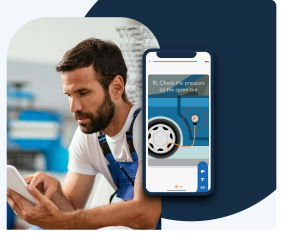Welcome to the fast-paced digital era, where the transformative power of mobile training is revolutionizing the way organizations provide effective learning experiences. It’s no secret that in the current dynamic landscape, training programs need to work smarter, not harder. And with deskless employees reigning supreme, making up a staggering 80% of the global workforce, harnessing the benefits of mobile training is no longer a nice to have, but a need to have.
In this post we delve into the advantages of mobile training and explore why companies worldwide are shifting gears to adopt this approach. From enhancing learning accessibility, to fostering flexibility in learning, and so much more, we’ll unlock the secrets that make mobile training a game-changer.
These benefits are especially powerful for organizations with deskless and field employees, but they are true for office-bound employees as well. With over 86% of the world’s population owning a smartphone, it’s no surprise that mobile training is coming into focus.
What is mobile training?
Mobile training refers to any training or learning content that you access from a mobile device. The terms mobile training, mobile learning, and m-learning are often used interchangeably, as they share the same meaning. When you hear these terms you should think of training that happens via a smartphone or tablet. This training can be delivered in the form of videos, podcasts, images and diagrams, text, digital flashcards, and more.
Benefits of mobile training
As we explore the world of mobile training, it’s essential to understand its advantages. Let’s uncover how embracing mobile training can truly revolutionize your organization’s learning and development initiatives:
1. Increased learning accessibility
With nearly everything being accessible with the click of a button, learning should be no different. By incorporating mobile learning deskless employees can conveniently access training materials on their mobile devices. Learning can happen anytime, anywhere. This flexibility empowers staff to learn at their own pace. Knowledge retention and application skyrocket. In fact, 41% of deskless employees stated that their training experience at work would be improved if they could complete it at their own pace.
2. Flexibility in learning
Mobile training provides a flexible learning environment, accommodating diverse learning styles and preferences. Whether it’s through interactive modules, videos, or quizzes, mobile training offers personalized learning experiences tailored to individual needs. This flexibility increases engagement and helps employees grasp concepts effectively.
3. Cost-effective training solution
Traditional training methods and in-person instruction often come with hefty costs. Travel expenses, dedicated training facilities, and hiring experts are just a few. Mobile training significantly reduces these expenses by leveraging existing mobile devices and platforms. In fact, a survey by TalentCards of 600 deskless employees found that 74% of employees feel comfortable with using their own, personal mobile devices to complete training. This cost-effective approach allows organizations to deliver high-quality training without sacrificing outcomes.
4. Instant learning and performance support
Mobile training enables real-time learning and support. With mobile training, your staff can access relevant information at their fingertips whenever a question arises. From job aids to on-the-spot troubleshooting guides, the power of mobile training grants deskless employees instant access to the knowledge they need with just a touch of a button. It’s like having a personal learning companion in the palm of their hand, ready to assist them on the go.
5. Improved employee engagement and retention
With the global labor shortage affecting all industries, employee retention efforts are at an all-time high. But did you know that 63% of deskless employees reported that access to additional training would help them feel more connected to their company’s values and mission?
Mobile training encourages active participation through interactive elements, gamification, and social learning features. Through this sense of involvement, organizations create a nurturing environment that fosters employee engagement, ultimately leading to higher retention rates. With mobile training as a driving force, you can cultivate a workforce that is not only skilled, but also deeply committed to your organization’s success.
6. Scalability and reach
The past few years have dramatically changed work locations. Now more than ever there needs to be an emphasis on providing easier access to resources. With a mobile learning app, organizations can efficiently distribute training materials to a large number of deskless employees, regardless of where they are. This scalability ensures consistent training across the workforce.
7. Tracking and analytics
The right mobile training platform is one that offers robust tracking and analytics capabilities. Organizations can monitor employee progress, identify knowledge gaps, and measure the effectiveness of training initiatives. Armed with these valuable insights, organizations can make data-driven decisions, paving the way for continuous improvement in training programs. With the power of tracking and analytics in their hands, training staff can unlock the potential for enhanced learning outcomes.
8. Overcoming geographical barriers
With deskless employees scattered far and wide, traditional training methods can feel like an uphill battle. Mobile training allows organizations to provide consistent training regardless of employee location. Whether out in the field, tending to customers in a bustling retail store, or on the go, deskless employees can access training materials seamlessly.
Beyond accessibility, having teams that are spread out across the globe also tends to mean that your learners speak different languages. With the right mobile training platform you can instantly translate your materials into multiple languages, and ensure that each of your employees receives the version of your content that is their native language.
9. On-the-go learning
Deskless work environments can be tricky when trying to find time for learning. Mobile learning helps employees squeeze in bite-sized training modules amidst their busy schedules. Whether they steal a few minutes during a break or seize moments of downtime between tasks, mobile training keeps the wheels of learning turning without disrupting their workflow.
10. Just-in-time training
Your staff regularly faces situations where instant access to information is crucial. Mobile training enables just-in-time training. With a mobile device, employees can tap into knowledge and resources precisely when they need them. This timely support enhances problem-solving capabilities and efficiency.
11. Seamless communication and collaboration
Imagine a world where deskless employees are seamlessly connected, sharing insights, engaging in lively discussions, and learning from one another. With mobile training, all of that is possible. A vibrant sense of community and knowledge sharing occurs. The result? Strengthened teamwork, an enriched learning culture, and endless possibilities.12. Standardized training
Maintaining consistent training standards for employees scattered across multiple locations can be challenging. Mobile training brings harmony to the chaos. Standardized training and content delivery means that all employees receive the same information. This unified approach enhances operational efficiency, smoothing out potential performance hiccups.
13. Increased efficiency and productivity
Training on mobile devices integrates seamlessly into the workday by optimizing time and resources. How? It eliminates the need for separate training sessions. Your staff can then apply what they’ve learned in real time. The result is increased productivity and success.
14. Compliance training for deskless employees
Compliance training is a critical part of many industries, and deskless employees are no exception. Mobile training offers a convenient and effective way to deliver compliance training modules. By keeping up to date with the latest rules and regulations you protect your company and staff. This approach mitigates compliance risks and supports a culture of adherence within the organization.
15. Empowering employee autonomy
The vast majority of training software out there has focused on the learning experience for desk-bound employees. Mobile training levels the playing field, empowering all types of employees to have access to training and resources in the palm of their hands. They hold the reins, choosing when and how they engage with training materials. This sense of empowerment ignites motivation, fueling their drive to take ownership of their professional growth.
Mobile training in a low cost, high return investment
Training holds the power to unleash the full potential of your employees. Whether out in the field, on the sales floor, or in customer service, the proper training can elevate their performance. Using a mobile training platform like TalentCards provides everything you need for high-quality and accessible training.
It’s not just about checking off a box; it’s about nurturing growth, and ultimately driving the success of your organization. So, choose wisely, for the training you provide holds the key to unlocking a world of endless possibilities for your deskless workforce.
Create mobile training that your teams can complete from anywhere

FAQs
What is a mobile training program?
A mobile training program is a training program that you can complete for a mobile device, such as a smartphone or tablet. Mobile training programs break free from the confines of traditional training methods and embrace the flexibility that mobile technology brings. With a mobile training program, learners can access information whenever and wherever they please, allowing for self-paced learning and repetition.
What are examples of mobile learning?
Mobile learning, often referred to as m-learning, encompasses various forms of learning activities that are accessed on mobile devices. Some examples of mobile learning include:
- Microlearning
- Videos
- Gamified learning
- Mobile apps
- Online quizzes
- Flashcard sets
How can I improve my mobile learning?
To enhance mobile learning consider the following tips:
- Make sure your content is mobile-first, or at least mobile-friendly. This means it’s designed to be consumed from a mobile device, and not just from a laptop or desktop computer.
- Include multimedia elements such as videos, audio, and interactive activities
- Create microlearning content that is quick to consume and matches the usage habits that people tend to embody on their smartphones
- Collect feedback on your mobile learning courses and adapt to your learners’ requests
Keeping up with the latest learning trends
With deskless employees comprising a significant portion of the workforce, and smartphone usage dwarfing laptop usage in the world, organizations must prioritize mobile training to keep up in the digital era. By embracing mobile training, organizations can revolutionize learning accessibility while empowering employees. The kind of training you provide your deskless workforce matters, as it holds the key to unlocking their potential and driving the success of your organization.
Key takeaways
- Enhance learning accessibility: Mobile training allows for learning anytime, anywhere, empowering employees to learn at their own pace and boosting knowledge retention.
- Flexibility in learning: Mobile training accommodates diverse learning styles and preferences, offering personalized learning experiences tailored to individual needs.
- Cost-effective training solution: Mobile training reduces expenses by leveraging existing mobile devices and platforms, delivering high-quality training without breaking the bank.
- Real-time learning and performance support: Mobile training provides instant access to information, enabling employees to troubleshoot and solve problems on the spot.
- Improved employee engagement and retention: Mobile training fosters active participation through interactive elements and social learning features, leading to higher employee engagement and retention rates.


